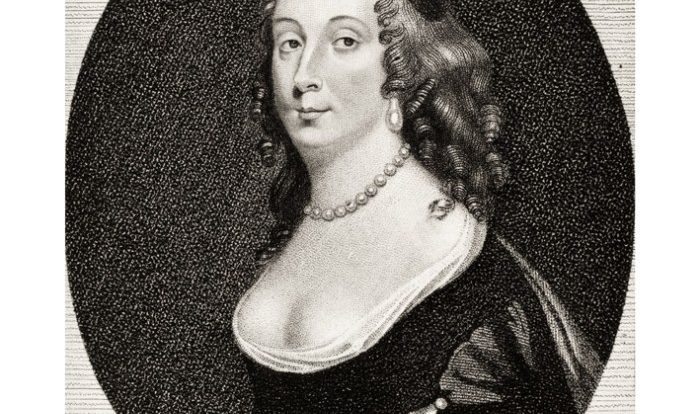Claude mckay the white house – Claude McKay: Literary Giant and Political Activist takes center stage, inviting readers into a world where literature and activism intertwine. This piece explores the remarkable life and legacy of a writer whose words ignited change and left an indelible mark on American and Caribbean literature.
From his early beginnings to his travels abroad, McKay’s journey is a testament to the power of storytelling and the human spirit. His literary contributions and political activism continue to inspire generations, making him a true icon of the Harlem Renaissance.
Claude McKay’s Early Life and Career: Claude Mckay The White House
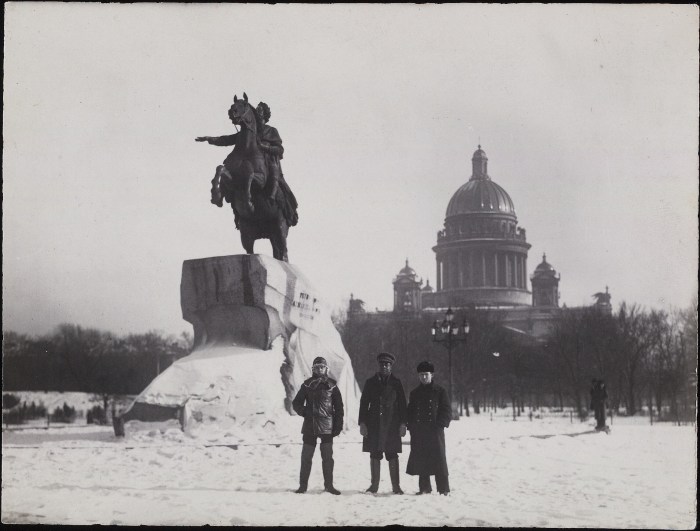
Claude McKay was born on September 15, 1889, in Sunny Ville, Jamaica. He was the son of Thomas Francis McKay, a farmer, and Hannah Elizabeth Edwards, a teacher. McKay’s early childhood was spent in poverty, and he received little formal education.
However, he was a voracious reader, and he began writing poetry at an early age.
In 1912, McKay left Jamaica for the United States. He settled in New York City, where he worked a variety of jobs while continuing to write poetry. In 1917, he published his first book of poems, Songs of Jamaica. The book was a critical success, and it helped to establish McKay as one of the leading poets of the Harlem Renaissance.
Early Literary Influences and Inspirations
McKay’s early literary influences included the works of William Shakespeare, John Keats, and Walt Whitman. He was also inspired by the Jamaican folk tradition, and his poems often reflect the rhythms and cadences of Jamaican speech.
Motivations for Becoming a Writer and Activist
McKay was motivated to become a writer by a desire to express the experiences of African Americans and other marginalized groups. He was also a strong advocate for social justice, and he used his writing to challenge racism and inequality.
McKay’s Harlem Renaissance Period
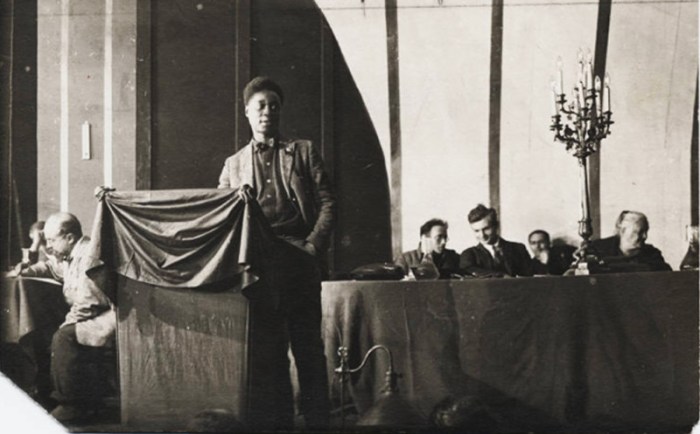
Claude McKay was a pivotal figure in the Harlem Renaissance, a flourishing of African American cultural expression that occurred in the 1920s and 1930s.
Contributions to Literature
McKay’s literary contributions during this period were substantial. His poetry, novels, and essays explored themes of race, identity, and social justice.
- Poetry:McKay’s poems, such as “If We Must Die” and “The White House,” captured the experiences and struggles of African Americans in a powerful and evocative manner.
- Novels:His novels, including “Home to Harlem” and “Banana Bottom,” provided insightful depictions of African American life in the urban North and the rural South, respectively.
- Essays:McKay’s essays, published in journals such as The Crisis, addressed issues of race, politics, and culture, offering a critical perspective on the social landscape of his time.
Themes and Styles
McKay’s works during the Harlem Renaissance exhibited distinct themes and styles:
- Race and Identity:McKay’s writing explored the complexities of racial identity and the challenges faced by African Americans in a racially segregated society.
- Social Protest:His works often contained elements of social protest, denouncing racial injustice and calling for equality and freedom.
- Literary Modernism:McKay’s writing incorporated elements of literary modernism, such as free verse poetry and stream-of-consciousness prose, reflecting the innovative spirit of the era.
McKay’s Political Activism
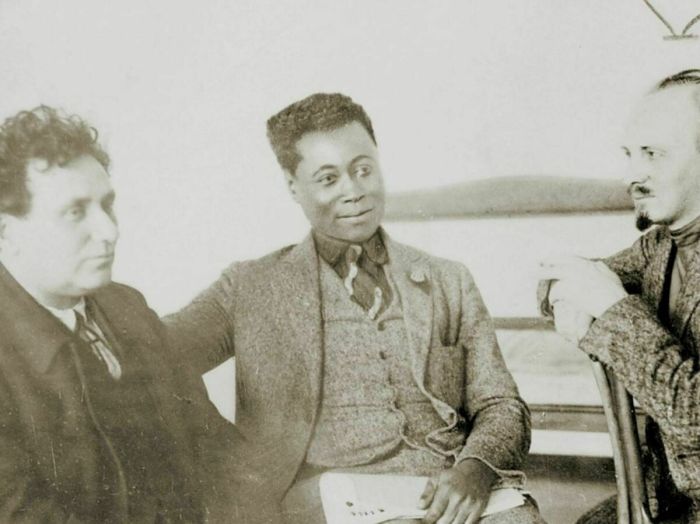
Claude McKay’s political beliefs were deeply rooted in his experiences as a black man in both Jamaica and the United States. He witnessed firsthand the racism and discrimination faced by his people, and this led him to become a passionate advocate for social justice.
McKay’s political activism began in his early years in Jamaica. He was involved in the Marcus Garvey movement, which promoted black nationalism and Pan-Africanism. After moving to the United States, McKay joined the Socialist Party and later the Communist Party.
He believed that socialism and communism offered the best hope for achieving a more just and equitable society.
McKay’s Involvement in the Socialist Party
McKay joined the Socialist Party in 1919. He was attracted to the party’s commitment to social justice and its opposition to imperialism. McKay was a vocal critic of the U.S. government’s treatment of African Americans, and he used his writing to promote socialist ideas.
Claude McKay’s time at the White House was marked by both triumph and controversy. Despite his accomplishments, his outspoken nature and political activism drew criticism from some quarters. However, his legacy remains intact as a powerful voice for social justice and equality.
His experiences in the White House offer a fascinating glimpse into the complexities of race and politics in early 20th-century America. For those interested in delving deeper into environmental issues, I recommend checking out the EPA Type 3 Practice Test . Returning to Claude McKay, his work continues to inspire and challenge, reminding us of the ongoing struggle for a more just and equitable society.
McKay’s Involvement in the Communist Party
McKay joined the Communist Party in 1922. He believed that the Communist Party was the most effective organization for fighting against racism and capitalism. McKay was a member of the Communist Party for several years, but he eventually left the party due to his disillusionment with its authoritarianism.
Influence of McKay’s Political Views on His Writing
McKay’s political views had a profound influence on his writing. His poetry and prose often explored themes of social justice, racial equality, and the struggle against oppression. McKay’s work was praised by critics for its honesty and its passion, and it helped to raise awareness of the plight of African Americans in the United States.
McKay’s International Travels and Later Years
Claude McKay’s international travels significantly influenced his writing and activism. After leaving the United States in 1922, he spent time in Europe, Africa, and the Caribbean. These experiences broadened his perspectives and deepened his understanding of global issues.
Travels to Europe
McKay’s travels to Europe exposed him to different political ideologies and artistic movements. He became involved with communist groups and attended the Third International Congress in Moscow. These experiences radicalized his political views and influenced the themes of his later writing.
Travels to Africa
McKay’s journey to Africa was a profound experience that had a lasting impact on his work. He traveled to Liberia, Nigeria, and Morocco, where he encountered the realities of colonialism and racial oppression. These experiences inspired him to write about the struggles of African people and to become a vocal advocate for their rights.
Travels to the Caribbean
McKay’s travels to the Caribbean brought him into contact with the rich cultural traditions of the region. He spent time in Haiti, Jamaica, and Trinidad, where he studied local folklore and music. These experiences influenced his writing, which began to incorporate elements of Caribbean culture and spirituality.
Influence on Writing and Activism
McKay’s international travels broadened his literary and political perspectives. His experiences abroad inspired him to write about social injustice, colonialism, and the struggles of marginalized people. He became a vocal advocate for the rights of African Americans, Africans, and Caribbean people.
Later Works
In his later works, McKay’s writing reflected the themes and styles he had developed during his travels. His poetry and prose became more politically charged and experimental, incorporating elements of surrealism and Afro-Caribbean traditions. His later works explored the complexities of race, identity, and the human condition.
McKay’s Legacy and Impact
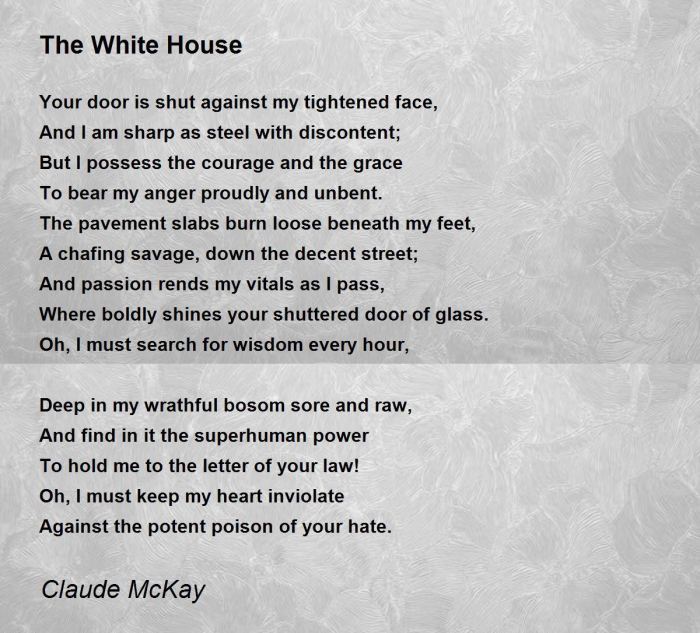
Claude McKay’s legacy as a writer and activist continues to resonate today. His work as a poet, novelist, and essayist challenged societal norms and inspired generations of writers and activists.
McKay’s exploration of race, identity, and social justice through his writing has had a profound impact on American and Caribbean literature. He is considered a pioneer of the Harlem Renaissance, and his work helped shape the movement’s focus on black identity and cultural expression.
Impact on Subsequent Generations, Claude mckay the white house
McKay’s writing has influenced countless writers, including James Baldwin, Maya Angelou, and Derek Walcott. His work has been translated into over 20 languages, and his ideas continue to inspire activists and artists around the world.
Contributions to American and Caribbean Literature
McKay’s work has made significant contributions to both American and Caribbean literature. His exploration of themes such as race, identity, and social justice helped to define the Harlem Renaissance and influenced the development of African American literature.
In the Caribbean, McKay’s work is celebrated for its portrayal of the region’s history, culture, and struggles. His novel “Banjo” is considered a classic of Caribbean literature, and his essays and poems have helped shape the region’s literary landscape.
FAQ Section
What was Claude McKay’s role in the Harlem Renaissance?
Claude McKay was a prominent figure in the Harlem Renaissance, a period of cultural and artistic flourishing among African Americans in the 1920s. He was known for his powerful poetry and essays that explored themes of race, identity, and social justice.
What political beliefs did Claude McKay hold?
Claude McKay was a socialist and later a communist. He believed in the power of collective action to address social and economic inequalities.
How did Claude McKay’s travels influence his writing?
Claude McKay’s travels to Europe, Africa, and the Caribbean exposed him to different cultures and perspectives, which broadened his worldview and enriched his writing. His experiences abroad inspired themes of diaspora, identity, and the global struggle for equality.
